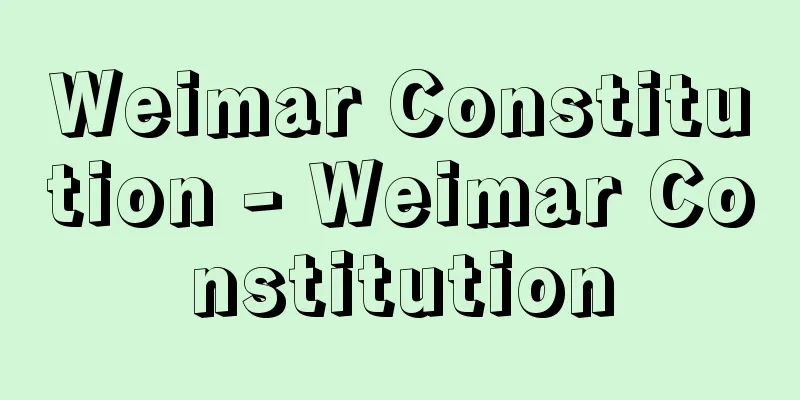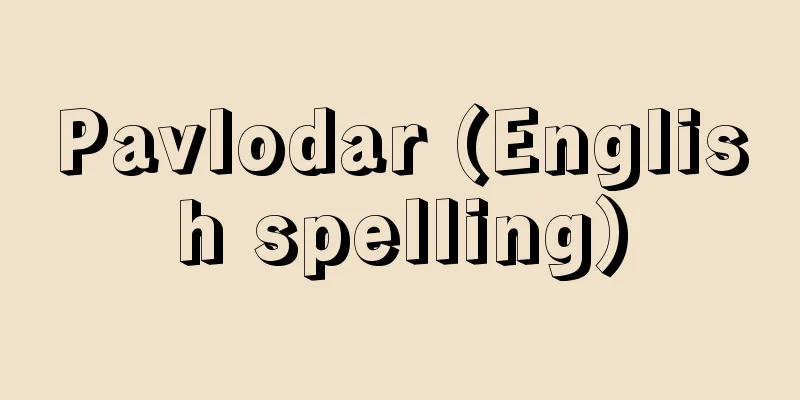Weimar Constitution - Weimar Constitution

|
The Constitution of the Weimar Republic. The German Empire collapsed in the German Revolution of 1918, and the National Assembly was held in February 1919. It gained the right to create a constitution by enacting the "Act on Provisional State Power". It deliberated the draft constitution drafted by H. Preuss, and after extensive revisions, passed it. This is the "Constitution of the German Nation of 11 August 1919" (Die Verfassung des Deutschen Reichs vom11 August 1919), and is generally called the Weimar Constitution after the place where the National Assembly met. It consists of a preamble and a body of 181 articles, divided into two parts: the first part is "The Composition and Functions of the Reich (Federation)" and the second part is "The Fundamental Rights and Fundamental Duties of the German People". This is a concrete embodiment of the idea that a modern constitution must define the governing structure of the state and a bill of rights. The characteristics of this constitution are as follows: (1) The continuation of the federal system. It inherited the federal system of the previous Bismarck Constitution, but weakened the dominance of Prussia and the power of each branch state (land). It also established a Reichsrat (Reich Council) to represent the land, and gave it the right to participate in legislation and administration. (2) Adoption of national sovereignty. It normalized the aforementioned imperial system, stipulating that "The German Reich shall be a republic. State power derives from the people" (Article 1), and appointed a president elected directly by the people as head of state and the highest administrative body. (3) Widespread introduction of democratic institutions. It guaranteed the principles of complete universality, equality, directness, and secrecy in elections for the Reichstag (Reichstag) and other elections, adopted proportional representation, and extensively introduced direct democratic institutions such as popular voting and popular initiatives. (4) Guarantee of social and human rights. The second part of the constitution contained over 50 provisions on the protection of fundamental rights of the people, recognized the principle of equality under the law, guaranteed traditional freedoms, and established a socialist fundamental right to life as a program provision, becoming the forerunner of subsequent constitutions around the world. However, with the rise of the Nazis, the "Presidential Decree for the Protection of the People and the State" issued in February 1933 based on the President's power to issue emergency decrees (Article 48) significantly restricted the freedom of the people, and the "Law for the Relief of Difficulties of the People and the State" (the so-called Enabling Act) in March of the same year completely rendered the constitution a mere formality. Germany was then on the verge of collapse. Source: Encyclopaedia Britannica Concise Encyclopedia About Encyclopaedia Britannica Concise Encyclopedia Information |
|
ワイマール共和国の憲法。 1918年のドイツ革命によりドイツ帝国が崩壊,翌 19年2月に国民議会が開かれ,議会は「暫定的国権に関する法律」を制定して憲法制定権を獲得,H.プロイスが起草した憲法草案を審議し,大幅に修正したのちに可決した。これが「1919年8月 11日のドイツ国憲法」 Die Verfassung des Deutschen Reichs vom11 August 1919であり,その国民議会の開会地にちなんで一般にワイマール憲法と呼ばれている。前文と 181ヵ条の本文とから成り,本文は2編に分けられて第1編は「ライヒ (連邦) の構成および任務」で第2編は「ドイツ人の基本権および基本義務」であった。これは,近代的憲法は国家の統治機構と権利章典とを定めたものでなければならないとの理念をそのままに具体化したものである。この憲法の特色は次のような点にある。 (1) 連邦制の存続。先のビスマルク憲法の連邦制を継承したが,プロシアの優位と各支分国 (ラント) の権限とは弱められた。そして,ラントを代表する機関としてのライヒ参議院 Reichsratを設け,立法および行政に参加する権限を与えた。 (2) 国民主権の採用。前述の帝制を規範化し,「ドイツ国は,共和国体とする。国権は国民から発する」 (1条) と定め,国民の直接選挙による大統領をおき,元首で最高行政機関とした。 (3) 民主主義的諸制度の広範な導入。ライヒ議会 Reichstagなどの選挙における完全な普通,平等,直接,秘密の原則の保障,比例代表制の採用,国民票決,国民発案などの直接民主制度の大幅な導入などを行なった。 (4) 社会権的人権の保障。第2編において国民の基本権の保障についての 50ヵ条をこえる規定を設け,法のもとの平等の原則を認め,また伝統的な自由権を保障するほか,プログラム規定としてではあるが社会主義的な生存権的基本権を定め,その後の世界各国の憲法の先駆となった。しかし,その後のナチスの台頭により,大統領の緊急命令発布権 (48条) に基づいて出された 33年2月の「国民および国家を保護するための大統領令」は国民の自由を大幅に制限し,さらに同年3月の「国民および国家の困難を除去するための法律」 (いわゆる授権法 ) はこの憲法をまったく形骸化してしまった。そしてドイツは崩壊へ向かった。
出典 ブリタニカ国際大百科事典 小項目事典ブリタニカ国際大百科事典 小項目事典について 情報 |
<<: Weimar Culture - Weimar Culture (English spelling)
>>: Weimar Republic (English spelling)
Recommend
Station
...The term "ekiya no ie" means a gover...
Sadayoshi - Jokei
Year of death: Kenpo 1.2.3 (1213.2.24) Year of bir...
Coulometry
When two or more metals coexist, electrolysis is ...
Olah, G. (English spelling) OlahG
...A carbocation with a charged carbon atom with ...
Air - English
This refers to the colorless, transparent gas tha...
NICS - Knicks
" Newly industrializing countries " is t...
Replacement
...While each school of Noh and Kyogen has its ow...
Knobelsdorff, Georg Wenzeslaus von
Born: February 17, 1699, near Crossen Died Septemb...
Princess Kushiinada
A goddess who appears in the Kojiki and Nihon Shok...
Onidaiko - Demon drum
A folk performing art performed at spring festival...
Kitaogawara
...The Iga River, which flows west from the Iga B...
Elenismo - Elenismo
…In Latin, it is Graecia, and in modern European ...
Ylang-ylang tree
An evergreen tall tree of the Annonaceae family. I...
Geng Yin Yearbook - Kouin Nenjaku
In 690 (the year of the Koin Tiger), by order of E...
Degree - Do (English spelling) degree
A unit that indicates the proportion of a quantit...









